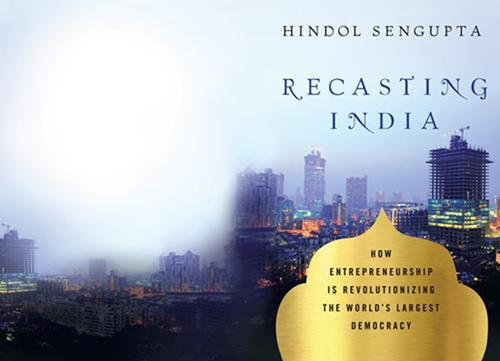Viewing India in a different light
14 May 2015
Hindol Sengupta is editor-at-large at Fortune India, the Indian edition of the Fortune magazine. He was one of the youngest journalists to have a prime time interview show with Talk Back at Bloomberg TV India. Sengupta has worked with CNBC TV18, CNN-IBN and IANS and authored five books. Some of his works like The Liberals (Harper Collins 2012) was praised by economist, author and public policy thinkers like Lord Meghnad Desai and Gurcharan Das. L K Advani wrote two blogs on Sengupta's book 100 Things to Know and Debate before You Vote (Harper Collins, 2014).
 | |
| Photo credit Reuben Singh |
His latest book Recasting India: How Entrepreneurship Is Revolutionizing the World's Largest Democracy (Palgrave Macmillan, 2014) was praised by global business thinker Vijay Govindarajan, renowned economist Arvind Panagariya and Infosys chairman N R Narayana Murthy. In 2012, Sengupta was voted by the Idea Mensch global platform among its list of social entrepreneurs who are changing the world. Sengupta is the founder of the Whypoll Trust, an open government not-for-profit. In this interview with Swetha Amit, he talks about the inspiration behind Recasting India, the potential for entrepreneurship in India and his upcoming book.
Your book Recasting India brings to fore the changes that are constantly remoulding our nation. So what was the inspiration behind it?
Recasting India was written with one seminal understanding - there is not enough appreciation for the kind of effort that millions of entrepreneurs make in India. These are the people who have been making in India, as it were. The India story when told to the world usually constitutes two sections - one is a state driven narrative and the other dominated by very large corporate houses.
Today half of India's GDP is brought in by the smaller entrepreneur, many of these [are] in what we call the 'informal sector'. And I believed that these were wonderful tales to tell. The efforts of these entrepreneurs and lesser known companies is largely unappreciated. Did you know that one of India's best performing banks is in Kashmir? Did you know that there are women who used to be manual scavengers who now make a successful detergent brand? There are hundreds of such stories.
How much do you think India has recast and remoulded itself over the years?
India has gone from a country where the state was the overarching, most powerful factor and determinant in everything to increasingly - though this journey is far from complete - it is in the individual who is at the heart of things more than ever before. This is not understood or appreciated enough. It is a definitive societal transformation.
As mentioned in your book, buildings like 'Antila' [the residence of billionaire Mukesh Ambani] highlights capitalism to a large extent, which tends to dampen a common man's dream to build his own tower of success. What do you think should be done to eradicate this growing difference between the rich and the poor?
At this stage in India's developmental cycle, what we ought to be thinking about is how to increase opportunities for everyone. In order to distribute wealth, we need to generate wealth. The economic liberalization in the last 25 years has pulled about 130 million Indians out of poverty. The government has a role to play - it is to simplify and then enforce the rule of law, make cities and towns safer, invest in infrastructure but beyond that it should get out of the way and allow entrepreneurs to flourish.
You have stated that modern India does not celebrate the rise of the common entrepreneur. But one does see inspirational stories of personalities like Dhirubhai Ambani, G Mallikarjun and Narayana Murthy who have made it big from humble beginnings. So could you elaborate your reasons for saying this?
In a country of 1.2 billion, there are barely a handful of such names. The reality is that for every one such name, a million names have been ignored and not given their due.
In our country, we either deify people or destroy them. I am arguing for a more holistic environment where we really celebrate enterprise at an everyday level. We need to see in our grocer, our milk delivery man, etc - as entrepreneurs who make our lives better and make the country better. They are job and GDP creators and should be cheered for it.
From your book, it is evident that a revolution is taking place in rural areas where the upper caste have no qualms of working in a factory run by Dalits. Why is it that such facts which will show India in a better light, fail to get highlighted?
I think these revolutionary changes do not get highlighted because there is a mind-set problem among people who write about such things in India. This mind-set is stuck in the solutions of the '60s and '70s whereas India has moved on to the 21st century. Enterprise and economics is one of the biggest answers to many of India's social divisions - I am not saying it is the only answer. But it is certainly one major answer. This has to be accepted now.
From your book, one can see that Kashmir has tremendous potential to flourish in terms of business enterprises. Unfortunately the continuous shambles in the valley act as a hindrance to such opportunities. Do you personally see a day when the valley actually flourishes in entrepreneurship?
Absolutely. What holds the valley back is short-sighted politics.
No sensible Kashmiri believes that the valley is better off with Pakistan. That idea is dead. The only thing is how to resolve the issues of the valley within India. It is as much a part of India as any other state and in that entrepreneurs there have benefited from the India growth story. This is not to deny the issues that the place faces. But I do believe development and economics are an integral part of the answer.
You have mentioned about the increase in the demand for the domestic help sector in one chapter. However a large part of this sector is seen getting educated, which will propel it to search for better job prospects. How do you see it affecting the lifestyles of 'Urban India"?
Urban India and urban Indians will have to relook at domestic help as they now do drivers - it is a specialised task and the more skilful the person is, the greater the salary he or she would draw. It cannot be an all-purpose help role. Domestic work has very specialised roles and skills. What you are paying for is a service - not a servant.
 | |
| Publisher : Palgrave Macmillan |
There is an interesting story in your book about how a man from a village started a business for sanitary napkins. From being labelled as a pervert and shunned by his own wife, he went on to become successful in his venture as a pad maker. What keeps such a person going with persistence even when the odds are stacked against him?
The belief that many entrepreneurs have that they will make the world a better place. Look, the news always tells us that entrepreneurs and entrepreneurship is all about or just about money. Well, it is about money but that is not all. Many, many entrepreneurs genuinely believe that they are going to make the world a better place. That is the drive that is the key thing that keeps them going. That is what we ought to champion.
How do you see India in the near future in terms of its revolutionizing capacity?
There are already a million revolutions happening in India - from the fight against caste to the fight against patriarchy. It is all happening here. I am most optimistic because everywhere I go, everything I see, the moral of the story is that never before have Indians fought harder to change their country for the better and change their lives for the better.
What are you working on next?
In my next book, I am delving deep into a subject very close to my heart and my identity. It looks at faith, identity and modernity in India. That's all I want to reveal at the moment.
| Excerpt from Recasting India: 'From Dung to Detergent' The women have been taught to make detergent with help of an industry body, the PHD Rural Development Foundation, and a chemical maker, Chemisynth group. A women's cooperative was created as the foundation that would create a product that could bring a livelihood to these women. A name was created- Neki, a Hindi word for decency, goodness, goodwill, which even has a popular phrase of its own. 'Neki aur puch, puch' meaning why ask so many times before doing something good. Together the women and the students came up with a formula for a detergent. It is now sold in two varieties - Neki Supreme, which sells at the higher end at around Rs70 per kilogram (2.2 pounds) and Neki Active, which sells at around Rs for one kilogram. At both ends, Neki is as expensive as some of the most popular brands in the market, including Tide and Surf. Initial testing of the product was done in several venues including the commercial washing areas or dhobi ghats, wholesale and retail outlets, department stores, hostels and residential areas in and around Ghaziabad. The project in its first year sold about 2,000 kilograms (4,409 pounds) of detergent from 15 selling points in and around Delhi. The profit margin for Neki Active is around Rs13 per kilogram and for Supreme around Rs27 per kilogram. The place where the detergent is made is a clean, single-storied house that has a large lawn, two rooms and a wide verandah. The women work on the concrete yard or the verandah to mix chemicals for the detergent. They come in around 9:30 every morning and start the day with morning prayers - long kept away from temples of every kind, this is almost a re-induction of these women into normal society. |


















